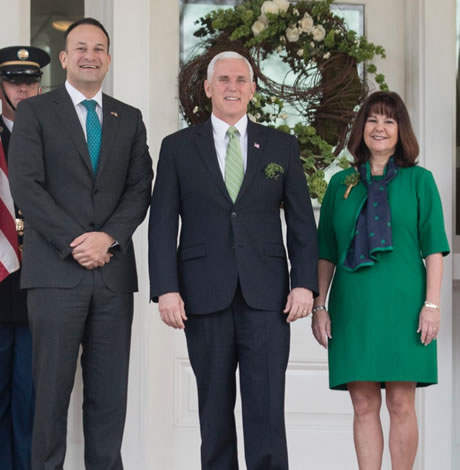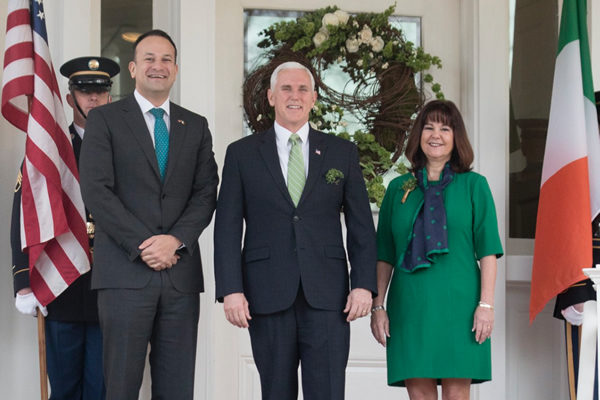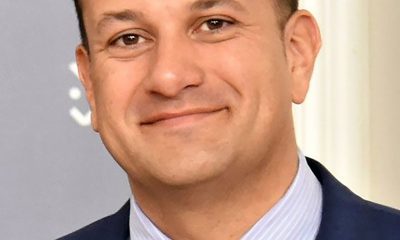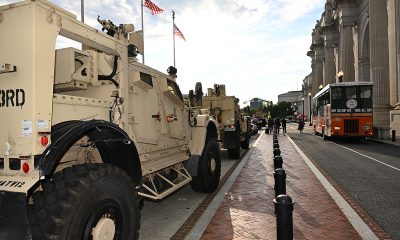Arts & Entertainment
Pence criticized for excluding media from breakfast with gay Irish PM
U.S.-Irish leaders meet for St. Patrick’s Day events


Vice President Mike Pence (center) and Second Lady Karen Pence (right) met with the gay Irish PM Leo Vardakar for St. Patrick’s Day breakfast. (Photo courtesy Twitter)
Vice President Mike Pence is taking heat for excluding the media from his breakfast meeting with Irish Prime Minister Leo Varadkar, who is gay.
The breakfast at the Naval Observatory is a tradition for St. Patrick’s Day, which is a time when the Irish leader makes his annual visit to Washington to meet with U.S. leaders. This year, Varadkar was representing Ireland during his first year as prime minister.
But this year was different than previous years: The breakfast was now between an openly gay leader of Ireland and a vice president with a draconian anti-gay record. What’s also different is that in the past reporters were able to attend the breakfast, but this time the exchange was closed to the media.
Prior to the breakfast, Varadkar was quoted in the Ireland publication TheJournal.ie as saying he’d like to raise LGBT issues with the vice president during the breakfast.
“I am going to be meeting him over breakfast on Friday morning, so if I have the opportunity I will certainly be mentioning the wider issue of equal rights and freedoms for LGBT citizens,” Varadkar said.
The nation’s largest LGBT group, the Human Rights Campaign, pounced on the closed-press nature of the breakfast as evidence Pence didn’t want to be seen with a gay person or be held accountable for his anti-LGBT record.
Ahead of his meeting with anti-#LGBTQ Mike Pence, Ireland’s openly gay Prime Minister Leo Varadkar said he wanted to bring up LGBTQ rights at the meeting.
Today, @mike_pence banned the media from covering the event.
Coincidence? ?
We don’t think so. https://t.co/ouJirE7dSL
— Human Rights Campaign (@HRC) March 15, 2018
Pence has an extensive anti-LGBT history. As a U.S. House member, Pence backed a U.S. constitutional amendment that would have banned same-sex marriage; he also opposed hate crimes protections legislation, “Don’t Ask, Don’t Tell” repeal and a version of the Employment Non-Discrimination Act.
Most prominently, Pence in 2015 as Indiana governor signed a “religious freedom” bill allowing businesses and individuals to refuse services and discriminate against LGBT people. After pressure from LGBT advocates and the business community, Pence was forced to sign a “fix” to the law significantly limiting its scope.
Pence has been dogged by comments from his 2000 campaign for the U.S. House stipulating he would support HIV/AIDS funding on the condition that resources are directed to institutions that “provide assistance to those seeking to change their sexual behavior.” That has been interpreted as support for “ex-gay” conversion therapy, although Pence through a spokesperson has denied he ever supported the practice.
The perception Pence backed conversion therapy came to the fore during the Winter Olympics when gay skater Adam Rippon said he wouldn’t meet with Pence because he “funded gay conversion therapy.” A Pence spokesperson asserted the claim was false. Tension grew when USA Today reported Pence sought a meeting with Rippon, but the skater declined it. Pence tweeted out the article was fake and pledged support for Rippon, but the public didn’t buy it based on the vice president’s anti-LGBT history.
Although the breakfast itself within the Naval Observatory was closed to media, reporters were granted access outside for Pence’s invite of Varadkar to the event. According to the U.K.-based Independent, Pence ignored questions shouted at him by reporters and Varadkar didn’t respond to a question about whether he’d bring up same-sex marriage with Pence.
Alyssa Farrah, a Pence spokesperson, affirmed the breakfast itself was closed to the press and said the two leaders already appeared together at events in the White House that were open to the media.
“The vice president and the prime minister met and spoke together at multiple events yesterday,” Farrah said. “Today’s informal breakfast is set up like every breakfast the vice president has had with a foreign leader following their meetings at the White House.”
According to the Irish media, the decision to close the event to press was made by the Pence camp. Farrah denied the breakfast was made closed press at behest of the vice president, but didn’t respond to a follow-up email on who made the decision.
Sources within the vice president’s office said there’s no precedent for open or closed press for this breakfast, even though last year’s breakfast was open press, because it’s only the second time the vice president has participated. (In 2015 and 2016, the breakfasts between then-Vice President Joseph Biden and then-Irish Prime Minister Enda Kenny were open press.)
The vice president’s office made public transcripts of remarks from Pence and Varadkar during the breakfast. Not once during those remarks, according to the transcripts, did either of the leaders articulate views on LGBT rights, despite Varadkar’s pledge to bring it up.
Also made public via the vice president’s Twitter account were photos of Pence and Varadkar together during the breakfast, which were captioned with words from Pence praising the U.S.-Ireland relationship.
Karen & I were honored to welcome Taoiseach Varadkar to our home at the Naval Observatory for an Irish breakfast. #StPatricksDay is the perfect time to celebrate our friendship & to marvel at Ireland’s lasting mark on America and the American people. pic.twitter.com/S9yroBwnf7
— Vice President Mike Pence (@VP) March 16, 2018
Honored to have joined @POTUS as we welcomed Irish Prime Minister Leo Varadkar to the @WhiteHouse today. Productive meetings with him & enjoyed celebrating the strong partnership between the U.S & Ireland at the #FriendsOfIreland Lunch & the annual Shamrock Exchange. pic.twitter.com/kz8MSGsxLd
— Vice President Mike Pence (@VP) March 16, 2018
Books
Love or fear flying you’ll devour ‘Why Fly’
New book chronicles a lifetime obsession with aircraft

‘Why Fly’
By Caroline Paul
c. 2026, Bloomsbury
$27.99/256 pages
Tray table folded up.
Check. Your seat is in the upright position, the airflow above your head is just the way you like it, and you’re ready to go. The flight crew is making final preparations. The lights are off and the plane is backing up. All you need now is “Why Fly” by Caroline Paul, and buckle up.

When she was very young, Paul was “obsessed” with tales of adventure, devouring accounts written by men of their derring-do. The only female adventure-seeker she knew about then was Amelia Earhart; later, she learned of other adventuresome women, including aviatrix Bessie Coleman, and Paul was transfixed.
Time passed; Paul grew up to create a life of adventure all her own.
Then, the year her marriage started to fracture, she switched her obsession from general exploits to flight.
Specifically, Paul loves experimental aircraft, some of which, like her “trike,” can be made from a kit at home. Others, like Woodstock, her beloved yellow gyrocopter, are major purchases that operate under different FAA rules. All flying has rules, she says, even if it seems like it should be as freewheeling as the birds it mimics.
She loves the pre-flight checklist, which is pure anticipation as well as a series of safety measures; if only a relationship had the same ritual. Paul loves her hangar, as a place of comfort and for flight in all senses of the word. She enjoys thinking about historic tales of flying, going back before the Wright Brothers, and including a man who went aloft on a lawn chair via helium-filled weather balloons.
The mere idea that she can fly any time is like a gift to Paul.
She knows a lot of people are terrified of flying, but it’s near totally safe: generally, there’s a one in almost 14 million chance of perishing in a commercial airline disaster – although, to Paul’s embarrassment and her dismay, it’s possible that both the smallest planes and the grandest loves might crash.
If you’re a fan of flying, you know what to do here. If you fear it, pry your fingernails off the armrests, take a deep breath, and head to the shelves. “Why Fly” might help you change your mind.
It’s not just that author Caroline Paul enjoys being airborne, and she tells you. It’s not that she’s honest in her explanations of being in love and being aloft. It’s the meditative aura you’ll get as you’re reading this book that makes it so appealing, despite the sometimes technical information that may flummox you between the Zen-ness. It’s not overwhelming; it mixes well with the history Paul includes, biographies, the science, heartbreak, and exciting tales of adventure and risk, but it’s there. Readers and romantics who love the outdoors, can’t resist a good mountain, and crave activity won’t mind it, though, not at all.
If you own a plane – or want to – you’ll want this book, too. It’s a great waiting-at-the-airport tale, or a tuck-in-your-suitcase-for-later read. Find “Why Fly” and you’ll see that it’s an upright kind of book.
The Blade may receive commissions from qualifying purchases made via this post.
Theater
Out actor Kevin Cahoon on starring role in ‘Chez Joey’
Arena production adapted from Broadway classic ‘Pal Joey’

‘Chez Joey’
Through March 15
Arena Stage
1101 Sixth St., S.W.
Tickets start at $93
Arenastage.org
As Melvin Snyder in the new musical “Chez Joey,” out actor Kevin Cahoon plays a showbiz society columnist who goes by the name Mrs. Knickerbocker. He functions as a sort of liaison between café society and Chicago’s Black jazz scene circa 1940s. It’s a fun part replete with varied insights, music, and dance.
“Chez Joey” is adapted from the Broadway classic “Pal Joey” by Richard Rodgers and Lorenz Hart. It’s inspired by John O’Hara’s stories based on the exploits of a small-time nightclub singer published in The New Yorker.
A warm and humorous man, Cahoon loves his work. At just six, he began his career as a rodeo clown in Houston. He won the Star Search teen division at 13 singing songs like “Some People” from “Gypsy.” He studied theater at New York University and soon after graduating set to work playing sidekicks and comedic roles.
Over the years, Cahoon has played numerous queer parts in stage productions including “Hedwig and the Angry Inch,” “La Cage aux Folles,” “Rocky Horror” as well as Peanut in “Shucked,” and George the keyboardist in “The Wedding Singer,” “a sort of unicorn of its time,” says Cahoon.
Co-directed by Tony Goldwyn and the great Savion Glover, “Chez Joey” is a terrific and fun show filled with loads of talent. Its relevant new book is by Richard Lagravenese.
On a recent Monday off from work, Cahoon shared some thoughts on past and current happenings.
WASHINGTON BLADE: Is there a through line from Kevin, the six-year-old rodeo clown, to who we see now at Arena Stage?
KEVIN CAHOON: Anytime I want to land a joke in a theater piece it goes back to that rodeo clown. It doesn’t matter if it’s Arena’s intimate Kreeger Theatre or the big rodeo at the huge Houston Astrodome.
I was in the middle stadium and there was an announcer — a scene partner really. And we were doing a back and forth in hopes of getting laughs. At that young age I was trying to understand what it takes to get laughs. It’s all about timing. Every line.
BLADE: Originally, your part in “Chez Joey” Melvin was Melba who sings “Zip,” a clever woman reporter’s song. It was sort of a star feature, where they could just pop in a star in the run of “Pal Joey.”
CAHOON: That’s right. And in former versions it was played by Martha Plimpton and before her Elaine Stritch. For “Chez Joey,” we switched gender and storyline.
We attempted to do “Zip” up until two days before we had an audience at Arena. Unexpectedly they cut “Zip” and replaced it with a fun number called “I Like to Recognize the Tune,” a song more connected to the story.
BLADE: Wow. You must be a quick study.
CAHOON: Well, we’re working with a great band.
BLADE: You’ve played a lot of queer parts. Any thoughts on queer representation?
CAHOON: Oh yes, definitely. And I’ve been very lucky that I’ve had the chance to portray these characters and introduce them to the rest of the world. I feel honored.
After originating Edna, the hyena on Broadway in “The Lion King,” I left that to do “Hedwig and the Angry Inch” as standby for John Cameron Mitchell, doing one show a week for him.
Everyone thought I was crazy to leave the biggest musical of our time with a personal contract and getting paid more money that I’d ever made to get $400 a week at the downtown Jane Street Theatre in a dicey neighborhood.
At the time, I really felt like I was with cool kids. I guess I was. And I never regretted it.
BLADE: When you play new parts, do you create new backstories for the role?
CAHOON: Every single time! For Melvin, I suggested a line about chorus boys on Lakeshore Drive.
BLADE: What’s up next for Kevin Cahoon?
CAHOON: I’m about to do the New York Theatre Workshop Gala; I’ve been doing it for nine years in a row. It’s a huge job. I’ll also be producing the “Cats: The Jellicle Ball” opening on Broadway this spring; it’s a queer-centric uptown vogue ball with gay actor André de Shields reprising his role as “Old Deuteronomy.”
BLADE: There’s a huge amount of talent onstage in “Chez Joey.”
CAHOON: There is. I’m sharing a dressing room with Myles Frost who plays Joey. He won accolades for playing Michael Jackson on Broadway. We’ve become great friends. He’s a miracle to watch on stage. And Awa [Sal Secka], a D.C. local, is great. Every night the audience falls head over heels for her. When this show goes to New York, Awa will, no doubt, be a giant star.
BLADE: Do you think “Chez Joey” might be Broadway bound?
CAHOON: I have a good feeling it is. I’ve done shows out of town that have high hopes and pedigree, but don’t necessarily make it. “Chez Joey” is a small production, it’s funny, and audiences seem to love it.

The Capital Pride Alliance held the annual Pride Reveal event at The Schuyler at The Hamilton Hotel on Thursday, Feb. 26. The theme for this year’s Capital Pride was announced: “Exist. Resist. Have the audacity!”
(Washington Blade photos by Michael Key)























-

 India5 days ago
India5 days agoActivists push for better counting of transgender Indians in 2026 Census
-

 Advice5 days ago
Advice5 days agoDry January has isolated me from my friends
-

 National5 days ago
National5 days agoAfter layoffs at Advocate, parent company acquires ‘Them’ from Conde Nast
-

 District of Columbia5 days ago
District of Columbia5 days agoCapital Pride reveals 2026 theme




















